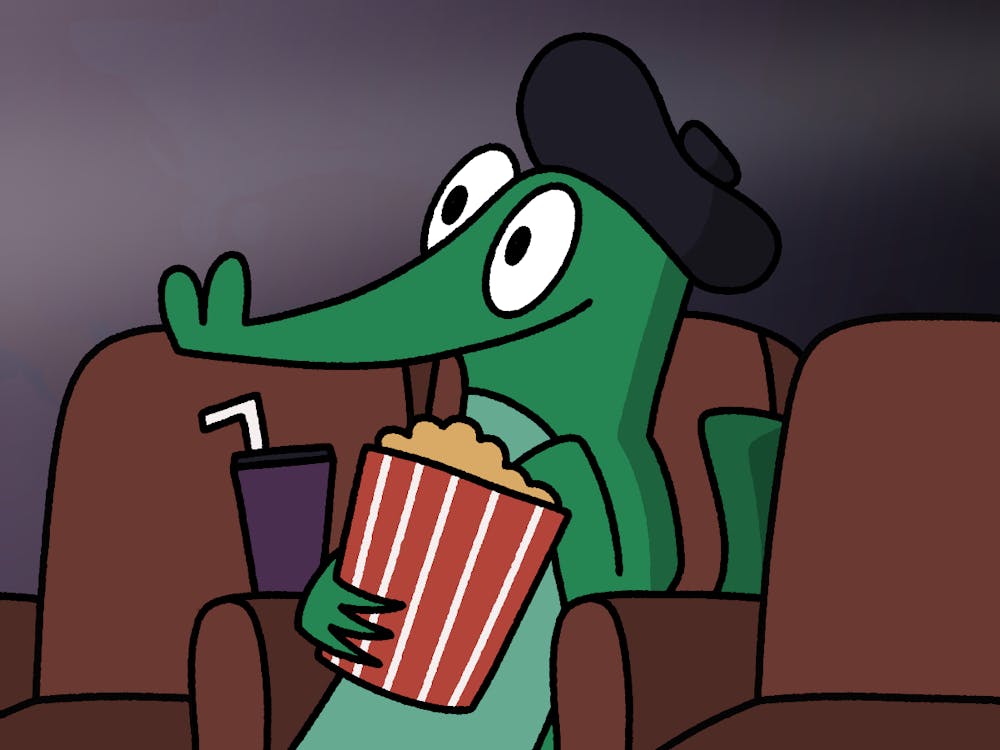Paul Thomas Anderson’s “One Battle After Another” is many things at once: a satire, a melodrama, a fever dream of American paranoia and, true to its title, a relentless series of both physical and ideological clashes. It’s an ambitious, wide-ranging film, equal parts absurd and searing, which dares audiences to laugh, gasp and occasionally wince at its excess.
I’ve seen plenty of Leonardo DiCaprio’s films (I’m still not over the ending of “Titanic”), but this was my first time stepping into Anderson’s world. The film’s boldness pulled me in, even when I wasn’t convinced it fit all together. Anderson doesn’t seem interested in neatness or restraint, and I found myself caught between admiration for his audacity and fatigue at his refusal to let the audience catch its breath.
At the center is DiCaprio as Bob Ferguson, a man living in witness protection after his youthful days in the far-left revolutionary group the French 75. In the film’s present day, he is a frayed survivalist father, fiercely protective of his teenage daughter Willa (Chase Infiniti).
But history has a way of dragging its old combatants back to the battlefield. Enter Col. Steven Lockjaw (Sean Penn), a snarling embodiment of repression and hypocrisy, who has built his military career as much on brutal crackdowns as on the secrets he hides.
The movie is rooted in a saga that stretches across decades, from radical jailbreaks and bank heists, to the shadow of betrayal that splinters the French 75, to the uneasy calm of witness protection and underground sanctuaries. What begins with youthful zeal soon mutates into cycles of violence, secrecy and survival. This is DiCaprio at his most fragile and fallible. His Bob is no glamorous outlaw; he’s a twitchy, drug-numbed man whose love for his daughter is the only compass left.
He stumbles often as he fights, but the stumbles are what make him human. In quieter moments, DiCaprio allows the character’s absurdities to shine through —- a father who can’t recall a secret password, a fighter who sometimes seems more scared than brave. It’s this blend of rawness and rueful comedy that gives the film its beating heart.
If DiCaprio provides the core, Anderson surrounds him with an ensemble of flamboyant forces. Penn’s Lockjaw is a grotesque, larger-than-life villain, veering between menace and near-parody. Teyana Taylor, as the radical Perfidia Beverly Hills, ignites the screen with both passion and volatility, a figure equal parts intoxicating and dangerous.
The film’s conflicts feel less like duels between people than collisions between ideas, and that’s where Anderson really digs in. His targets — America’s obsession with revolution, repression, racial purity and the fantasy of control — are broad but potent. This expansiveness mostly works; the satire feels sharp rather than haphazard, though at times the weight of so many themes risks tipping into overindulgence.
He stages raids on detention centers, shadowy supremacist clubs and convents of insurgent nuns with the same operatic bravo as he does rooftop escapes or desert gunfights. I found the absurdity both thrilling and tiring; the set-pieces land as punchlines provocations, but stitched together they felt almost overwhelming.
At nearly three hours, “One Battle After Another” is as relentless as its title suggests. Anderson doesn’t just keep the pedal down, he pushes it through the floorboard.
Given the fact that my attention span is horrible these days, I struggled to keep up with the film’s extensive runtime. There were stretches I found myself drifting, only to be jolted back in by some wild moment.
Anderson has crafted a film that is big, brash and unapologetically messy. It’s far from perfect, but the occasional lulls didn’t take away from the experience. There was an energy to it that felt raw and alive, the kind of cinematic risk-taking I don’t often see anymore.
By the final frames, the film had pummeled me with so many battles, both literal and ideological, that I felt both stimulated and wrung out. What kept me tethered through the chaos was DiCaprio; his performance is messy, funny and unexpectedly tender — a rare turn that feels intimate even as everything around him explodes.
Here’s hoping DiCaprio doesn’t have to fight a bear this time to get his Oscar — this wild ride should be more than enough.
Contact Aaliyah Evertz at aevertz@alligator.org. Follow her on X @aaliyahevertz1.

Aaliyah is a second-year journalism student in her second semester at the Alligator. She is the Avenue's spring 2026 entertainment reporter. In her free time, she enjoys reading and baking.






